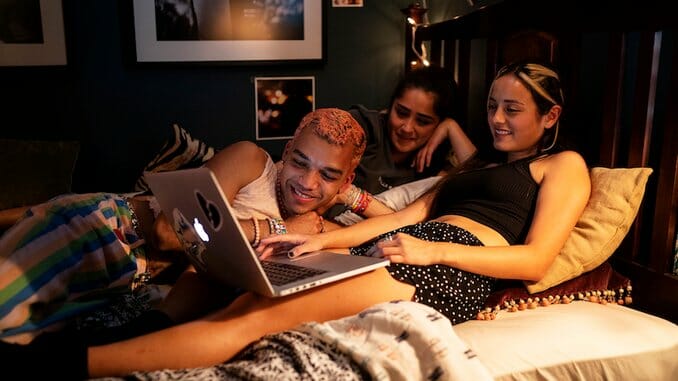The Wild Gen-Z Antics of Genera+ion Make for Surprising Comfort TV
Photo Courtesy of HBO Max
There comes a point in any coming-of-age narrative in which a character exultantly leaps into a pool. Often fully-clothed, often feeling misunderstood, and always reaching a climactic point in their teenage years, these moments are not just a cliché; the pool scene is iconic in teen films and TV shows. Euphoria. Booksmart. We Are Who We Are. The Edge of Seventeen. Lady Bird. Eighth Grade. Now, just five episodes into HBO Max’s new teen series Genera+ion, we’ve already been gifted not one but two blissful jump-into-the-water-fully-clothed incidents. Created by father-daughter duo Daniel and Zelda Barnz (the latter is a teen herself), this new Gen-Z hit leans into the clichés that make teen dramas so juicy, scandalous, and fun to watch—even if it’s not all that serious.
Genera+ion tosses together an ensemble of Gen-Z teens, a generation (mine, in fact) famed for biting at their parents like snapping turtles and Snapchatting into oblivion. Like the adolescents we’ve met in other notable prestige coming-of-age HBO series, they are each distinct, yet riddled with anxiety and anger, questioning their sexuality and future. Chester (Justice Smith) helms the series, a rebellious dress code rioter famed for his glittery crop-tops and lilac puffs of hair. He’s falling for the school’s new counselor—dangerous territory—but Chester’s also got an admirer in awkward prepster Nathan (Uly Schlesinger). Riley (Chase Sui Wonder) assists Nathan in understanding his sexuality while she navigates her own, growing closer to Greta (Haley Sanchez). To top it all off, some moments of this half-hour series flash forward a few months into the future, where Nathan’s twin Naomi (Chloe East) and her friend Arianna (Nathanya Alexander) help an unknown girl give birth in a mall bathroom. It’s a lot.
What the series does well, and actually takes seriously, is the frequent infatuation these teens feel for their peers, social media, and for anything that interests them in a split second. More often than not, one of the teens is lusting after someone; it’s hardly love, but they stalk their prey on social media, in classes, across hallways, into crowded rooms at parties. A touch transforms into a drug, a first love spiraling into an addiction. That obsession presents itself at the micro-level, too: these kids are hooked to their phones. The concept of being politically correct clings to them like a magnet; they’re all online, all the time, and obsession presents itself in different forms on the internet. Even though Genera+ion satirizes many aspects of Gen-Z, these neurotic attractions feel deeply tethered to a real problem, and the show treats it as such.
That same understanding is present in shows like Euphoria and We Are Who We Are, two prior entries in what has become a sequence of HBO coming-of-age dramas. But while those series (particularly the former) gave their young characters space to breathe and enjoy one another’s company, Genera+ion frequently dodges larger topics by scrambling to another quirky Gen-Z take. Like flicking through a fleeting series of Instagram stories, everything moves too quickly. It grows tacky and overdone as the series reaches its midpoint. Instead of rising to new heights like Zendaya’s performance in Euphoria or Jordan Seamón’s in We Are Who We Are, the lead cast of Genera+ion more often become the butt of one long joke against Gen-Z. It’s funny at first, but eventually, it’d be nice to actually empathize with these kids.
-

-

-

-

-

-

-

-

-

-

-

-

-

-

-

-

-

-

-

-

-

-

-

-

-

-

-

-

-

-

-

-

-

-

-

-

-

-

-

-








































